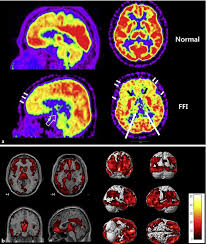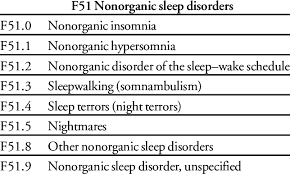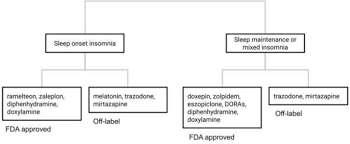Fatal Familial Insomnia: The Rare and Devastating Sleep Disorder
Fatal Familial Insomnia (FFI) is a rare and fatal genetic sleep disorder that affects the sleep-wake cycle and leads to a progressive deterioration of mental and physical health. This devastating condition is characterized by the inability to fall asleep, resulting in severe insomnia that worsens over time.
FFI is an autosomal dominant inherited disease, meaning that a person only needs to inherit one copy of the defective gene from either parent to develop the disorder. The mutated gene responsible for FFI causes abnormal proteins to accumulate in the brain, leading to the degeneration of specific areas involved in sleep regulation.
Individuals with FFI typically begin experiencing symptoms in mid-adulthood, although onset can occur at any age. The initial signs of FFI often include insomnia, followed by hallucinations, weight loss, and cognitive decline. As the disease progresses, individuals may experience complete loss of sleep, severe dementia, and eventually death within months to a few years.
Diagnosing FFI can be challenging due to its rarity and similarity to other sleep disorders. Genetic testing is often required to confirm the presence of the mutated gene associated with FFI. Unfortunately, there is currently no cure for this devastating condition, and treatment options focus on managing symptoms and improving quality of life.
Research into FFI continues in hopes of better understanding the underlying mechanisms of the disease and developing potential treatments or interventions. In the meantime, support from healthcare professionals, genetic counselors, and palliative care specialists can help individuals and families affected by FFI navigate this difficult journey.
As we strive to unravel the mysteries of Fatal Familial Insomnia, raising awareness about this rare disorder becomes crucial in promoting early detection and providing compassionate care for those impacted by its devastating effects.
9 Essential Tips for Understanding and Managing Fatal Familial Insomnia
- Understand that fatal familial insomnia is a rare genetic prion disease.
- Recognize the symptoms such as insomnia, panic attacks, hallucinations, and weight loss.
- Consult a medical professional for proper diagnosis and treatment.
- Genetic testing can help determine if you carry the faulty gene linked to fatal familial insomnia.
- Supportive care and symptom management are important in dealing with this condition.
- Joining a support group can provide emotional support and information about coping strategies.
- Maintain a healthy lifestyle with regular exercise and balanced nutrition.
- Seek counseling or therapy to manage stress and anxiety related to the condition.
- Stay informed about research advancements and clinical trials related to fatal familial insomnia.
Understand that fatal familial insomnia is a rare genetic prion disease.
Fatal Familial Insomnia is a rare genetic prion disease that affects the sleep-wake cycle and leads to a progressive deterioration of mental and physical health. This devastating condition is caused by a mutated gene that results in abnormal proteins accumulating in the brain, leading to the degeneration of specific areas involved in sleep regulation. Understanding that fatal familial insomnia is a rare genetic prion disease is crucial in recognizing its hereditary nature and the challenges associated with diagnosis and treatment.
Recognize the symptoms such as insomnia, panic attacks, hallucinations, and weight loss.
Recognizing the symptoms of Fatal Familial Insomnia, such as insomnia, panic attacks, hallucinations, and weight loss, is crucial for early detection and intervention. Individuals experiencing persistent sleep disturbances, unexplained anxiety episodes, visual or auditory hallucinations, and unexplained weight loss should seek medical attention promptly. By being aware of these warning signs and seeking timely medical evaluation, individuals at risk for Fatal Familial Insomnia can potentially receive appropriate care and support to manage the progression of this rare and devastating sleep disorder.
Consult a medical professional for proper diagnosis and treatment.
It is crucial to consult a medical professional for a proper diagnosis and treatment if you suspect you or a loved one may be experiencing symptoms of Fatal Familial Insomnia (FFI). Due to the complexity and rarity of this genetic sleep disorder, seeking guidance from healthcare experts can help in accurately identifying the condition and exploring available treatment options to manage symptoms and improve quality of life. Early intervention and support from medical professionals, including genetic counselors and sleep specialists, are essential in addressing the challenges associated with FFI and providing appropriate care for individuals affected by this devastating disease.
Genetic testing can help determine if you carry the faulty gene linked to fatal familial insomnia.
Genetic testing plays a crucial role in identifying individuals who may carry the faulty gene associated with fatal familial insomnia. By undergoing genetic testing, individuals can gain valuable insight into their risk of developing this rare and devastating sleep disorder. This information not only allows for early detection and intervention but also enables individuals to make informed decisions about their health and future well-being.
Supportive care and symptom management are important in dealing with this condition.
Supportive care and symptom management play a vital role in dealing with Fatal Familial Insomnia (FFI). Due to the progressive and ultimately fatal nature of this rare genetic sleep disorder, focusing on providing comfort, addressing symptoms, and enhancing quality of life becomes paramount. Healthcare professionals, caregivers, and support networks play a crucial role in helping individuals with FFI navigate the challenges associated with the condition. By offering compassionate care, managing symptoms effectively, and providing emotional support, those affected by FFI can experience improved well-being and a better overall quality of life during their difficult journey.
Joining a support group can provide emotional support and information about coping strategies.
Joining a support group can be a valuable resource for individuals and families affected by Fatal Familial Insomnia. These groups offer a supportive environment where members can share their experiences, emotions, and challenges related to the condition. In addition to emotional support, support groups provide a platform for exchanging information about coping strategies, treatment options, and resources available for managing FFI. By connecting with others who understand the unique struggles of living with this rare disorder, individuals can find comfort, guidance, and a sense of community in their journey with Fatal Familial Insomnia.
Maintain a healthy lifestyle with regular exercise and balanced nutrition.
It is important for individuals at risk of fatal familial insomnia to maintain a healthy lifestyle by incorporating regular exercise and balanced nutrition into their daily routine. Physical activity can help improve overall sleep quality, reduce stress levels, and promote mental well-being. Additionally, a diet rich in essential nutrients can support brain health and function, potentially slowing down the progression of symptoms associated with FFI. By prioritizing exercise and nutrition, individuals with a genetic predisposition to fatal familial insomnia can proactively take steps to enhance their overall health and quality of life.
Seek counseling or therapy to manage stress and anxiety related to the condition.
Seeking counseling or therapy can be instrumental in managing the stress and anxiety that often accompany a diagnosis of Fatal Familial Insomnia. Dealing with a rare and fatal genetic sleep disorder like FFI can be overwhelming, and having professional support can provide individuals and their families with coping strategies, emotional guidance, and a safe space to express their fears and concerns. Therapy can help individuals develop resilience, improve their mental well-being, and navigate the challenges of living with FFI in a supportive and understanding environment.
Stay informed about research advancements and clinical trials related to fatal familial insomnia.
Staying informed about research advancements and clinical trials related to Fatal Familial Insomnia (FFI) is crucial for individuals and families affected by this rare and devastating sleep disorder. Keeping up-to-date with the latest developments in FFI research can provide hope for potential treatments, interventions, and improved understanding of the disease. By actively seeking information on clinical trials, individuals impacted by FFI can contribute to the progress of scientific knowledge and potentially access innovative therapies that may offer relief or slow disease progression. It is essential to stay connected with healthcare providers, support groups, and research organizations to stay informed about opportunities for participation in clinical trials and to be part of the ongoing efforts to combat Fatal Familial Insomnia.




